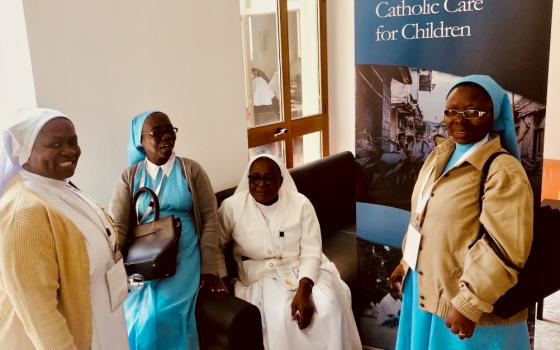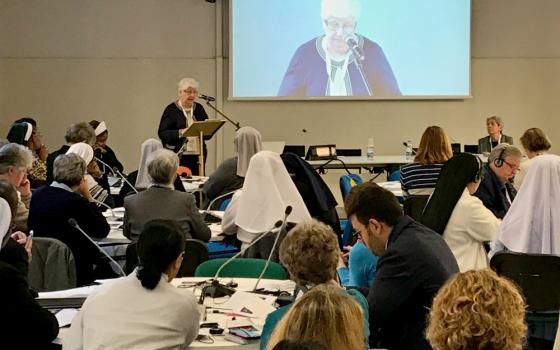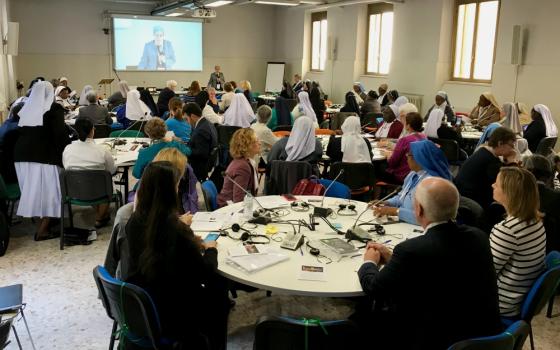A painting by Joey Velasco from the Philippines showing street children seated with Jesus around the Last Supper table moved me deeply as a two-day workshop began devoted to child protection: "Sowing Hope for Children in Our Care." Thirty years ago, the United Nations adopted the Convention on the Rights of the Child, and yet it is only in the past few years that the rights of children are being more widely recognized along with action to make these rights count.
Sisters have engaged in child care for hundreds of years, for orphans made so through wars, famines and other tragedies and for children sent by parents and relatives unable to care for them. Today, institutionalization of children is being called into question as we acknowledge that institutions did not and do not always provide the best way to ensure children's safety, socialization and health.
The workshop, held in Rome May 2-3 ahead of the International Union of Superiors General's 2019 plenary assembly, was a collaborative of the GHR Foundation of Minneapolis and UISG to deepen understanding of the movement to rethink institutional care of children.
Sr. Pat Murray, executive secretary of UISG and a sister of the Institute of the Blessed Virgin Mary, reminded us of our scriptural and Christian responsibility to care for orphans and widows and acknowledged that no institution is perfect.
"There is always a need for professional updating, innovation and willingness to change," she said.
Janestic Twikirize from Makerere University in Kampala, Uganda, presented us with a detailed overview of new trends in the care for children. Twikirize is mother of two children and cares for 10 others without parents. She described how current world situations began changing traditional family and kinship systems of child care in the late 1970s.
The HIV/AIDS pandemic was impetus for increased faith-based institutions, usually called orphanages, but many morphed into care for "social orphans": children who had parents, but poverty, conflict and migration made it impossible for them to remain with their families.
Twikirize noted four needs of children in child care and protection:
- Secure attachment as foundation for a healthy life;
- Socialization, including values and skills formation;
- Security and belonging;
- Participation and integration into a community.
These needs cannot be well addressed in groups. Each individual's needs are different and have to be taken into account. Institutional care, because of sheer numbers and need for control, rarely attends to individual health, developmental and socioemotional differences.
Care reform emphasizes prevention of the need for institutional care and a trend to deinstitutionalization. Reform includes legal and policy frameworks that provide guidelines for alternative and safe care of children back into family and kin settings.
Kathleen Mahoney from the GHR Foundation then unveiled an exciting project of the foundation for mapping global, regional and national numbers of Catholic institutional care of children and vulnerable people gleaned from the Vatican's Annuarium Statisticum, which lists 10 different types of church-sponsored institutions, including ones sponsored by sisters. The project will expand to make it possible to digitally find all of our ministries on a global map.
The project also focuses on accuracy of terms, as Kathleen's presentation evoked discussion about how ambiguous the term "orphanage" is today. Most institutions include a variety of children in their care who are not technically without parents.
St. Joseph Sr. Tesa Fitzgerald from Hour Children in Queens, New York, pleaded with us not to forget the needs of children whose mothers are incarcerated. Her organization works with women in prison to help them be good mothers even while incarcerated. At Hour Children, their children live together as a family and remain connected to their mothers.
Day two of the conference expanded the discussion of the first day. Kelley Bunkers, a child protection consultant in Kenya, spoke to Article 20 of the U.N. Convention on the Rights of the Child, which stresses the importance of alternatives to child care when nuclear families are unable to carry out their responsibilities. Appropriate care must be afforded each individual child's needs, and goals must include prevention of separation, strengthening families, expanding alternative options, and finding missing families for reintegration of the child.
A panel of three sisters and a layman presented global best practices: a local area model, congregational addressing of the issue, and collaboration of national religious conferences.
Sr. Barbara Staley of the Missionary Sisters of the Sacred Heart of Jesus described her experience in a remote community of Swaziland, where the community requested help for families devastated by HIV and tuberculosis. The chiefs told the sisters that their community was overwhelmed by parents dying and leaving many children behind.
Orphanages were not part of this community's history, and such an idea was unacceptable. However, boarding schools were possible, and when the sisters opened the first one, even without electricity or water, 98 traumatized children were brought, all of them without a name or family name.
The sisters were overwhelmed. They had to learn what made a family in their Swaziland community. So the search began for the children's nuclear or extended family members. Nuclear family was elusive, so the sisters sought relatives or others willing to claim the children. They set up an individual case-management system, and as only two sisters were missioned there, collaboration with the community and eventually the government became imperative.
Thus, individual needs of children and collaboration of the community and government became the new norm — even though without an institution, things moved slowly.
Good Shepherd Sr. Madonna Wimaladasa shared that her Sri Lanka province chose child-rights-based care as part of its strategic plan when the congregational chapter in 2015 mandated strategic planning across all levels of the congregation.
The plan was to educate and empower local communities of tea-pickers to take responsibility for the children they had left with the sisters as they worked long hours in tea fields that were sometimes far from their homes. The province organized self-help groups, parenting classes and education about children's rights. Transition from the institutional system of care to community-based has been challenging. It is not an easy change for either sisters or families who are used to having the sisters care for their children. The children are also being educated to understand that they have rights and skills to advocate for themselves, a source of pride for the parents.
Sacred Heart Sr. Alice Jacan, a human rights civil lawyer, and Joseph Sentongo, a computer scientist/data manager, presented their experience of the Association of Religious in Uganda's efforts to begin the transition from institutional care of children to family- and community-based care. The government was promoting new laws and policies for institutional care of children, and when a study was carried out of all the institutions run by women and men religious in Uganda, it was found that most were below the new standard for qualified staff.
The results of the study were alarming to the religious, the primary risk of the changes being the loss of identity of charism: A number of the congregations were founded to care for orphans.
Instead of resisting change, the entire conference took up the challenge to find ways to rearticulate and re-vision their charisms and mission in light of the new laws. Such a collaboration is a marvelous example of humility and cooperation. The conference now has a department for child protection that monitors this new movement.
I found this program so insightful and was inspired by the courage and passion of each presenter for their advocacy and commitment to children.
[Joyce Meyer is a member of the Sisters of the Presentation of the Blessed Virgin Mary and is GSR's liaison to women religious outside of the United States.]



